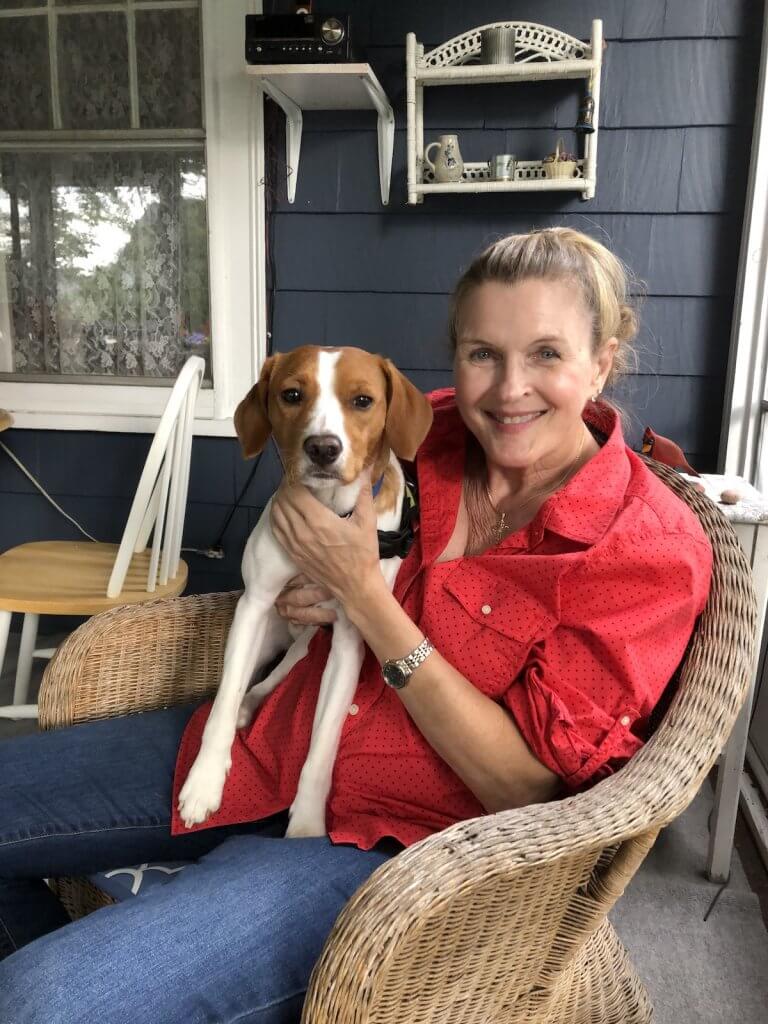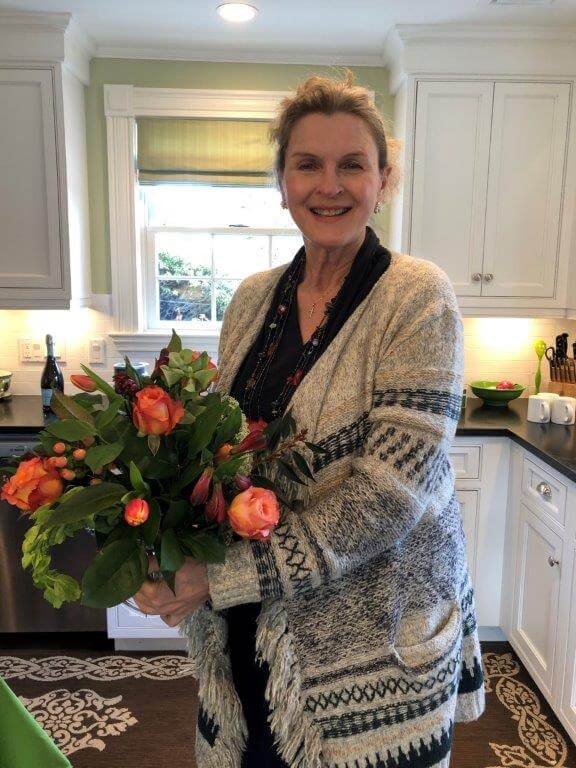Dawn MacKerron realizes it might sound strange to say that getting hit in the eye with a basketball was a blessing. But an accident on the court helped inform treatment for a rare form of lymphoma and participation in a clinical trial at Dana-Farber that set her on a cancer-free path.
It all started when MacKerron noticed she had floaters in her left eye after the pick-up game in January 2016. She consulted a Boston-area ophthalmologist, who performed a full exam with imaging. Her eye was bruised and bleeding but would heal on her own, the doctor noted.
By April, though, the 56-year-old Belmont sales engineer was losing vision in her left eye. She returned to the ophthalmologist, who saw that her optic nerve was highly inflamed.

“He said, ‘This has nothing to do with the January incident; this is a whole different thing going on,’” she recalls.
While doctors conducted a battery of tests to try to identify the cause of the inflammation, MacKerron’s vision worsened to the point she couldn’t drive. Her balance and cognitive skills declined, too. The ophthalmologist then performed a biopsy to check for intraocular (eye) cancer.
“With intraocular lymphoma, it’s very common to develop a leopard pattern on the eye,” MacKerron says. “He saw that during surgery and knew right away, without the biopsy results, what I was facing.”
‘Only one doctor in the world I’d want you to have.’
A subsequent MRI in August 2016 with a primary care physician her family had known for decades confirmed the diagnosis: primary central nervous system lymphoma with ocular involvement (PCNSL), a rare aggressive cancer. Only about 20 percent of lymphomas that start in the central nervous system involve the eye.
“He told me, ‘For what you are facing, there is only one doctor in the world that I’d want you to have. She is at Dana-Farber,’” MacKerron says.
He scheduled a consult for her the next day with neuro-oncologist Lakshmi Nayak, director of the Center for Central Nervous System (CNS) Lymphoma. MacKerron attended the consult in a wheelchair.
“My motor skills had deteriorated, my left side wasn’t functioning and my hands and feet were turned in,” she says. “I couldn’t walk on my own and wasn’t fully cognizant of what was happening.”
Nayak’s expertise immediately put MacKerron at ease as they reviewed an MRI dotted with a couple dozen tumors.
“Dr. Nayak said, ‘This is a very aggressive cancer. It is invasive, grows very fast and spreads quickly throughout the brain and the nervous system. But, we can treat it aggressively, eliminate it completely and help you recover,’” MacKerron recalls.
Because MacKerron had a full eye exam with imaging in January after her basketball injury, Nayak had an invaluable baseline to work from in drawing up a treatment plan.
“She saw that I didn’t have any tumors in January, so she knew how aggressive this cancer was,” MacKerron says. “That information tailored the treatment plan.”

The plan prescribed a series of eight in-patient chemotherapy sessions, scheduled every other week, with outpatient infusion therapy in the weeks between. PCNSL has a high recurrence rate, so, in January 2017, once her chemotherapy regimen ended and the cancer was in remission, MacKerron underwent a stem cell transplant. An autologous transplant uses high-dose chemotherapy to completely destroy any remaining microscopic cancer cells and then replenishes the body with healthy harvested stem cells.
“The prospect that I could be cancer-free for life with a stem cell transplant was all I needed to hear,” MacKerron says.
Her transplant was part of a clinical trial spearheaded by Nayak that aimed to measure the effectiveness of the procedure on patients with primary central nervous system lymphoma.
After a stem cell transplant, the immune system must rebuild from scratch, leaving patients extremely vulnerable to infection. MacKerron was in isolation for 30 days at the hospital, then in quarantine for another 90 days in her completely sanitized home. Her family and close friends looked after her.
A clean bill of health
By the summer of 2017, MacKerron felt back to full strength. Her brain power was back. She returned to work full time. She adjusted to driving with vision in only one eye, which is permitted in Massachusetts. She joined a cancer support group and became a mentor to other patients. Most importantly, she was strong enough to care for her 89-year-old mother, who passed away from a rare appendix cancer in July 2018.
MacKerron still sees Nayak for checkups, although at increasingly longer intervals. At each visit, she has received a clean bill of health. While she can no longer play basketball, she has doubled up on her golf outings and leads an active lifestyle.
“In so many ways, my health feels better than before I became sick,” she says. “I have energy all day. With a stem cell transplant, everything is new, and you feel it. I’m not just surviving, but thriving.”

Congratulations Dawn MacKerron on your amazing strength to go through all you have and are thriving today. You’re very inspiring to me. Thank you.
I’m a proud supporter of Dana-Farber. Thank you Dana-Farber and Neuro-Oncologist Lakshmi Nayak for all you did to help Dawn MacKerron beat her primary nervous system lymphoma cancer. Truly amazing. I hope hearing this will encourage you to keep doing the wonderful work you’re doing.
Sincerely, Malcolm